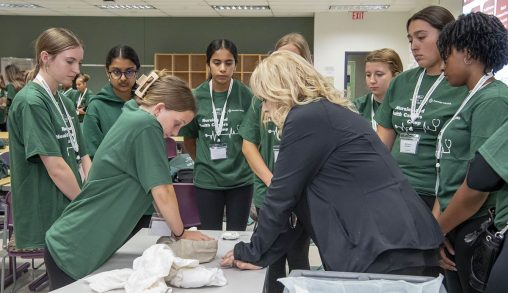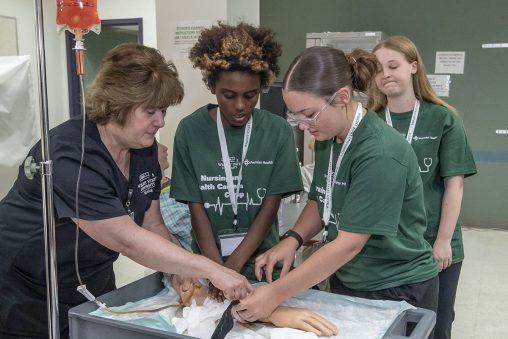
The Wright State and Premier Health Nursing and Health Careers Camp immersed 46 high school students in hands-on medical training and eye-opening experiences that sparked their passion for health care careers. (Photos by Erin Pence)
Wearing full personal protective equipment — including hair nets, face masks, gloves and gowns — local high school students cared for “patients” in simulated hospital beds during a hands-on health care experience at Wright State University.
The activity was part of the Wright State and Premier Health Nursing and Health Careers Camp, held June 24–25 on the Dayton Campus and June 26 at Miami Valley Hospital. Now in its third year, the camp welcomed 46 rising juniors and seniors from 29 high schools across the region.
Campers learned life-saving skills including CPR, how to use an automated external defibrillator (AED), how to stop severe bleeding and the basics of physical and occupational therapy. Students also gained insights into a wide range of health care careers.
“It’s a way for students to engage and have fun exploring the aspects of health care without any pressure,” said Marty Sexton, Ph.D., dean of Wright State’s College of Health, Education and Human Services.
Sexton said the camp helps students move beyond common assumptions about nursing.
“It’s extremely valuable because students think they know what nursing is, but when they come to camp, they have a whole different appreciation for how nurses contribute to the entire healthcare team,” she said.
For instance, the campers learned how nurses confer with social workers and about the types of rehabilitation. The students also explored the interdisciplinary nature of health care, learning how nurses collaborate with social workers and rehabilitation specialists, and were introduced to careers beyond nursing.
Students attending the camp are introduced not only to nursing but also to a variety of other health and helping professions.
“This interprofessional exposure helps them understand the collaborative nature of health care and the diverse career pathways available,” Sexton said. “In addition to fostering respect for team-based care, this broader perspective supports informed decision-making as they explore future educational and professional opportunities. It also ensures that, even if a path in nursing isn’t the right fit, they are aware of other meaningful roles in the healthcare system where they can make a difference.”
A key goal of the camp is to build up the region’s health care workforce. Tara Konicki, Ph.D., clinical assistant professor and chair of the School of Nursing, said the number of health care professionals dropped during the COVID-19 pandemic but interest in the field is rebounding.
Early exposure to nursing careers is critical to addressing the region’s clinical workforce challenges, said Lisa Gossett, chief nursing officer at Premier Health.
“When students at a young age see how diverse, valuable and fulfilling a career in nursing can be, that really sticks with them,” Gossett said. “It helps solidify a decision to pursue nursing or another health profession as part of their future.”

High school students practice life-saving techniques during a Stop the Bleed training session at the Nursing and Health Careers Camp at Wright State.
There’s evidence the camp is fulfilling its mission.
“At the end of each day, students were led through reflection questions,” said Bethany DeLong, associate director of enrollment and retention in the College of Health, Education and Human Services. “Each day a camper shared that our activities helped them firm up their decision on future education and career goals.”
Camp organizers received overwhelmingly positive feedback, said Rachel Schwab, enrollment and retention coordinator for the college. “Campers were highly engaged, participating in several hands-on activities and trainings, asking questions throughout camp,” she said.
Peyton Fife, a junior nursing major from Springfield, led the campers on campus tours and offered insight into student life at Wright State.
“It seems to bring reassurance that college isn’t as difficult as some make it out to be,” she said.
Fife added that the campers were “engaged and interested in what I had to say. They were incredibly kind and thoughtful.”
Wright State also benefits from the camp, Sexton said.
“It brings in forward-thinking, high-caliber students in nursing and other health professions,” she said. “Our graduates are very well respected in the area. We want prospective students to know how good we are, and how good our faculty is.”

 Nursing and Health Careers Camp at Wright State gives high school students hands-on experience
Nursing and Health Careers Camp at Wright State gives high school students hands-on experience  Wright State videographer Kris Sproles wins regional Emmy and Ohio journalism award
Wright State videographer Kris Sproles wins regional Emmy and Ohio journalism award  Wright State’s Lake Campus ranked as Ohio’s best value in higher education
Wright State’s Lake Campus ranked as Ohio’s best value in higher education  Wright State University earns Collegiate Purple Star renewal for support of military-connected students, veterans
Wright State University earns Collegiate Purple Star renewal for support of military-connected students, veterans  Five friends reunite in Wright State’s Boonshoft School of Medicine
Five friends reunite in Wright State’s Boonshoft School of Medicine 